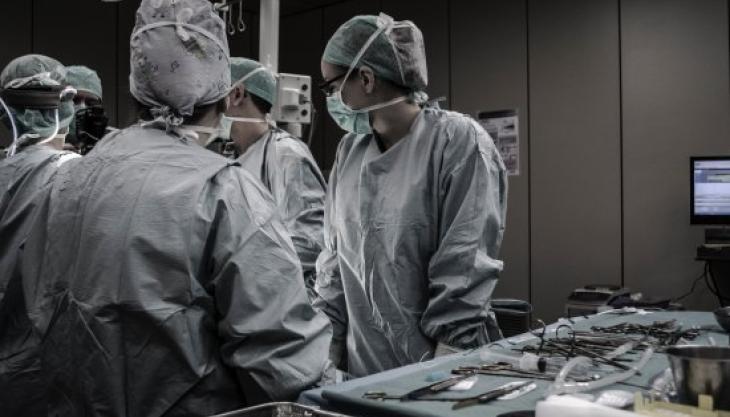How Wilmington Medical Debt Can Wreck Your Finances – And How Bankruptcy Can Help
Submitted by Rachel R on Tue, 11/21/2017 - 9:29am

Medical costs can be overwhelming
Image via Piron Guillaume on Unsplash
The fact is that you can be hale and hearty one day and in a world of hurt the next, unable to work because of an accident or illness. Accidents and illness often carry the one-two punch of lowering your income while increasing your expenses. This problem can quickly lead to spiraling Wilmington medical debt that eats up your savings, wrecks your finances, and puts your future at risk. Today we take a look at how quickly medical debt can rack up, how medical insurance isn’t always a barrier, and what you can do to recover and move on with your life.
Most people don’t expect medical problems
While everyone knows that medical problems are a fact of life, few expect it to strike them personally. Whether it’s a cancer diagnosis, chronic illness, work or auto accident, or other issue, most people are taken off guard by a medical crisis. To make things worse, even having medical insurance may not be a barrier to financial problems triggered by medical problems. According to CNBC, about one-fourth of Americans have no emergency fund to help them combat unexpected expenses.
What’s worse is that those aged 53-62 make up a large percentage of those that don’t have emergency cash tucked away, yet they are prime for illness or injury to strike. Those surveyed by Bankrate, in the info published by CNBC, blame unemployment and other financial problems associated with the recession that began a decade ago. But even for those with an emergency fund, it might not be enough because medical costs are always on the rise and insurance itself can be tricky.
Premiums and deductibles may be high
Even given the advent of the Affordable Care Act, many Americans are underinsured or insured with a policy they cannot afford to use. Many services require you first to fulfill your deductible which can be up to $6500 for an individual before insurance kicks in to cover services. And, depending on your policy, even after insurance begins to pick up part of the tab, copays and coinsurance may still apply.
There are also services and treatments that don’t fall under insurance but which you might want because they can improve your prognosis. And if you’re one of those that have chosen to skip ACA coverage and pay the penalty instead, an unexpected health crisis can find you paying 100% out of pocket. This can prove fatal to a Wilmington family’s finances.
Medical costs go beyond treatment expenses
In addition to medical bills themselves, health problems come with other costs that can impact Wilmington consumers. For starters, you may have travel expenses and parking fees to get your medical treatments. There are also copays associated with prescription medications. You might even be prescribed medications that your insurance doesn’t cover but which are medically necessary.
There are also over the counter remedies that insurance won’t pay for, but that might benefit your illness. To complicate matters, if you can’t work and don’t have disability insurance, your income may suffer. Even those with disability insurance typically don’t receive as much from insurance as they would if they were able to work. And what if you can’t work for a prolonged period? Your finances may be devastated.
How bankruptcy helps with medical costs
For those that consider Wilmington bankruptcy after a costly medical crisis, it’s important to note that debt relief can be sweeping. Medical bills are considered unsecured debt. If you file Chapter 7 bankruptcy, you can get 100% of unpaid medical bills discharged. With a Chapter 13 bankruptcy repayment plan, you can see a significant portion (if not all) of your medical debt discharged.
Those that suffer a medical crisis often accumulate credit card debt as well, and this debt is also unsecured. In most cases, 100% of your credit card debt can be eliminated with Wilmington Chapter 7 and most (if not all) using Wilmington Chapter 13. If your health crisis has a shelf-life, such as recovering from an accident, you might want to time your bankruptcy to file it once you’ve recovered.
In other cases, with a lingering illness, you might want to file when the debt becomes unmanageable, even knowing that you will still have recurring expenses. To find out more about the benefits of bankruptcy related to medical debt, contact the Law Offices of John T. Orcutt. Read recent client reviews then call +1-833-627-0115 for a free Wilmington bankruptcy consultation at one of our locations in Raleigh, Durham, Fayetteville, Wilson, Greensboro or Wilmington.
Resource:
Debts Hurt! Got debt? Need help? Get started below!
Serving All of North Carolina
- Bankruptcy Attorneys Raleigh NC (North)
- Bankruptcy Attorney Fayetteville NC
- Bankruptcy Attorney Durham NC
- Bankruptcy Attorneys Wilson NC
- Bankruptcy Attorneys Greensboro NC
- Bankruptcy Attorneys Southport NC
- Bankruptcy Attorneys Wilmington NC
Bankruptcy Attorneys Raleigh NC (North)
6616 Six Forks Rd #203 Raleigh, NC 27615 North Carolina
Tel: (919) 847-9750

Bankruptcy Attorney Fayetteville NC
2711 Breezewood Ave Fayetteville, NC 28303 North Carolina
Tel: (910) 323-2972

Bankruptcy Attorney Durham NC
1738 Hillandale Rd Suite D Durham, NC 27705 North Carolina
Tel: (919) 286-1695


Bankruptcy Attorneys Greensboro NC
2100 W Cornwallis Dr. STE O Greensboro, NC 27408 North Carolina
Tel: (336) 542-5993

Bankruptcy Attorneys Southport NC
116 N Howe St. Suite A Southport, NC 28461 North Carolina
Tel: (910) 218-8682

Bankruptcy Attorneys Wilmington NC
116 N. Howe Street, Suite A Southport, NC 28461 North Carolina
Tel: (910) 447-2987
